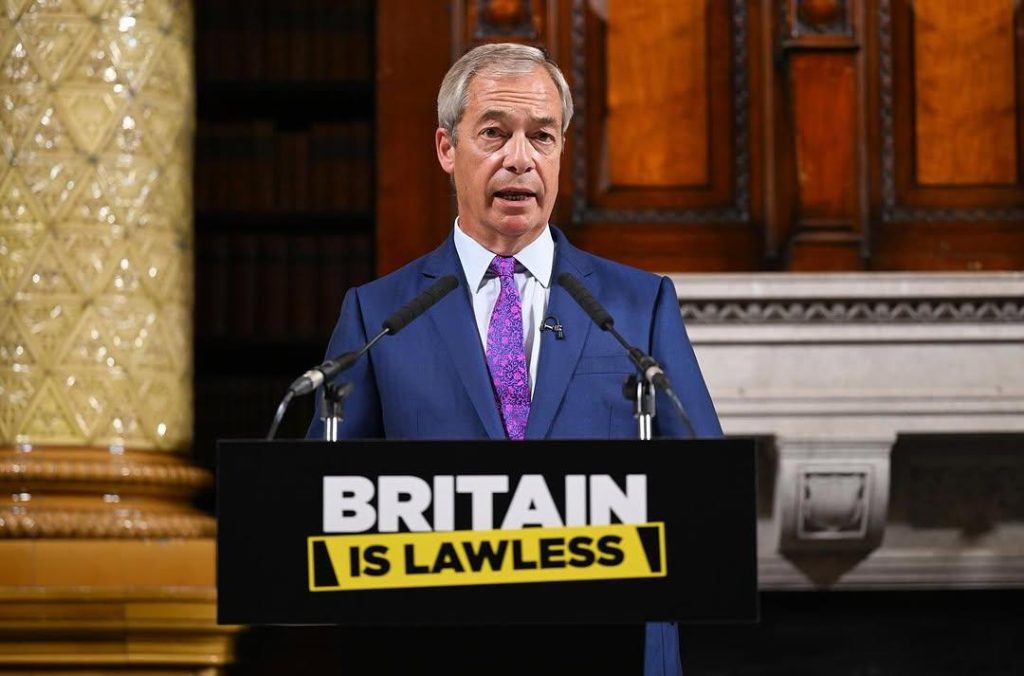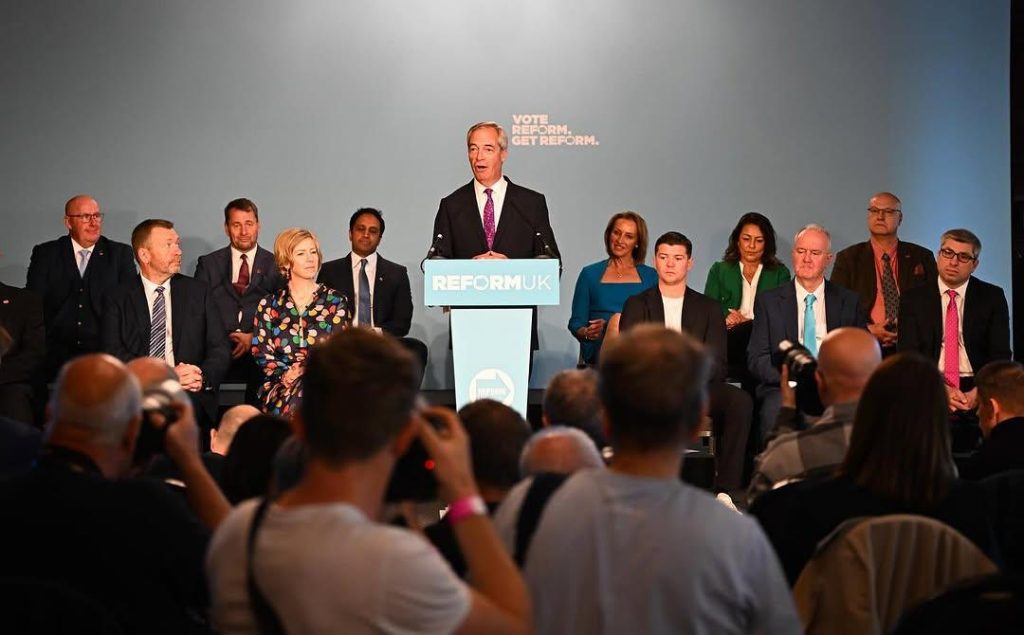Nigel Farage remains one of the most polarising figures in modern British politics. In 2025, as leader of Reform UK, he re-emerged as a formidable political force, reshaping debates around immigration, crime, family policy, and freedom of speech. His ability to tap into working-class frustrations and scepticism toward establishment parties continues to change the political landscape of the UK.
From Eurosceptic Firebrand to Working-Class Champion
Farage first rose to prominence as the outspoken face of the Brexit campaign, championing the UK’s departure from the European Union. Now, his Reform UK party is leading polls, with recent YouGov figures showing it ahead at 28% of voter intention, surpassing Labour and the Conservatives. What sets this new phase apart is Farage’s focused appeal to working-class voters, a demographic that traditional right-wing parties have struggled to fully capture.
In May 2025, he promised policies that resonate deeply with these communities, such as ending the cap on child benefits and nationalising key companies. His vow to abolish the child benefit cap, set during the Conservative-Liberal Democrat coalition in 2013, aims to ease financial pressures on larger families—a move reminiscent of Labour’s traditional social welfare agenda. However, he frames this through a nationalist lens, emphasising the importance of supporting “British families” rather than immigrants, reinforcing his tough immigration stance.
The Crime Agenda: Ambitious but Controversial
More recently, Farage has turned his attention to crime reduction. In a campaign launched in July 2025, he vowed to halve crime rates within five years, starting with recruiting 30,000 extra police officers and implementing the “most stringent” anti-crime measures in UK history. This move seeks to position Reform UK as a party of governance capable of delivering law and order, potentially appealing to voters frustrated by perceived rises in anti-social behaviour and violent crime.
While ambitious, experts remain sceptical about the feasibility of such rapid reductions. However, this focus on security complements Farage’s broader platform of national sovereignty and public safety, key pillars of his political identity.
Controversies and Parliamentary Scrutiny
Farage’s career remains shadowed by controversy. As of July 2025, he is under investigation by the Parliamentary Standards Commissioner for allegedly breaching rules requiring MPs to register financial interests within 28 days. Though Farage denies any wrongdoing or undisclosed income, the inquiry adds another dimension to his unpredictable political journey.
His combative style often leads to clashes with opponents and officials. For instance, his harsh criticism of the UK’s newly implemented Online Safety Act has generated headlines and political fallout. Farage condemned the law as “dystopian” and pledged to repeal it if his party gains power. The Act requires tech companies to verify ages and monitor harmful content online, but critics including Farage argue it suppresses free speech.
The Online Safety Act controversy escalated after Cabinet Minister Peter Kyle accused Farage of siding with sex offenders by opposing the legislation, referencing the notorious Jimmy Savile scandal. Farage vehemently rejected these claims, branding them “disgusting” and accusing ministers of fearmongering. This episode highlights the deeply divided views on balancing online safety with freedom of expression in the UK and echoes wider debates between British and American approaches to regulation.
Farage’s international engagements have also been marked by tension. During a US House Judiciary Committee visit to London, he clashed with Democratic lawmakers over free speech and internet regulation, dramatically interrupting discussions and provoking sharp responses. Such incidents reinforce Farage’s reputation as an unyielding populist willing to challenge political norms on both sides of the Atlantic.

Impact on UK Politics and Society
Nigel Farage’s Reform UK is challenging the traditional two-party dominance, reshaping public conversation on immigration, social welfare, and crime. His capacity to draw working-class voters while maintaining a nationalist and anti-establishment message unsettles both Labour and Conservative parties.
Critics warn that his divisive rhetoric risks widening social fractures, especially around immigration and identity. Supporters argue he articulates genuine concerns ignored by mainstream politics, presenting practical solutions for housing, welfare, and public safety.
The tension between protecting civil liberties and enforcing tougher regulations, exemplified in the Online Safety Act debate, underscores the complex policy dilemmas confronting the UK in the digital age. Farage’s vocal opposition ensures these debates remain in the public eye.
What Lies Ahead for Farage and Reform UK?
With the next general election some time away, Farage faces the dual challenge of broadening Reform UK’s appeal beyond its core base and developing detailed policy positions that convince voters of their readiness to govern. His continued presence in Westminster and media ensures his influence on UK politics remains significant.
As of August 2025, observers will watch closely to see if Reform UK’s election poll leads translate into tangible electoral success. Meanwhile, Farage’s confrontational style and willingness to court controversy guarantee he remains a headline-grabbing figure.
Conclusion
Nigel Farage in 2025 is at a crossroads—both a kingmaker tapping into deep-seated public anxieties and a divisive figure provoking fierce criticism. His focus on working-class issues, crime reduction, and resistance to government regulation keeps him relevant in a fractured political landscape. With Reform UK surging in polls, his role in shaping the UK’s future debates on immigration, liberty, and social welfare cannot be underestimated.
UK readers should expect Nigel Farage to remain a prominent and contentious voice in national dialogue for the foreseeable future, as the country grapples with questions of identity, governance, and freedom in a rapidly changing world.
Read more;Joao palhinha



